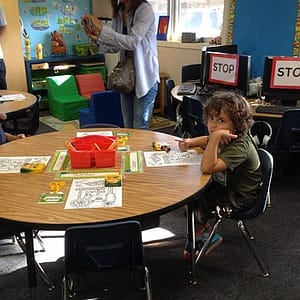Music education plays a significant role in the development of children, offering far more than just learning to play an instrument or sing. If you’re interested in giving your child the best opportunities for growth and success, exploring the benefits of music education is essential. This article discusses why every child should have the chance to engage with music early on. You can also find further resources on this topic through this anchor text, which links to additional helpful content.
Music Education Boosts Brain Development and Academic Skills
Learning music has been shown to strengthen brain function in numerous ways. Engaging with music can activate different parts of the brain, improving memory, attention, and problem-solving abilities. Studies reveal that children who participate in music education tend to perform better in subjects like mathematics and reading. This is because music trains the brain to recognize patterns, develop spatial-temporal skills, and improve coordination. Early exposure to music sets a strong foundation for academic achievement and mental agility.
Enhancing Emotional Intelligence and Creativity Through Music
Music allows children to express themselves emotionally in ways that words sometimes cannot. It cultivates a sense of emotional awareness and empathy by encouraging kids to connect with feelings through melody and rhythm. Beyond emotional growth, music sparks creativity. Children learn to experiment with sounds, compose, and improvise, which nurtures inventive thinking and problem-solving skills. Music education fosters an environment where imagination flourishes, providing children with tools to think outside conventional boundaries.
Building Social Skills with Group Music Activities
Participating in group music lessons, choirs, or bands teaches children the value of teamwork and cooperation. These experiences help youngsters improve communication skills and ability to listen and respond to others thoughtfully. Music requires synchronization and respect for peers, creating a supportive community where children learn collaboration. These social benefits extend beyond music classes, positively influencing interpersonal relationships and teamwork in various life situations.

How Music Education Fosters Confidence and Resilience
Learning to play an instrument or perform in front of others can boost a child’s confidence significantly. Mastering a musical skill involves dedication, patience, and overcoming challenges—qualities that build resilience. Children who engage with music often develop a sense of achievement and pride that motivates them to tackle other difficulties in life. The supportive feedback and encouragement from instructors and peers further enhance their self-esteem and persistence.
Cultivating Cultural Awareness Through Music
Music education exposes children to diverse cultures and histories, broadening their understanding of the world. Exploring different musical traditions encourages respect and appreciation for diversity. This cultural exposure promotes open-mindedness and helps children develop a wider or global perspective, which is increasingly important in today’s interconnected society. Through music, children gain insights into traditions and values …






 Your vocal technique is the foundation upon which your operatic career will be built. It’s crucial to develop a strong and versatile voice that can handle the demands of this challenging genre. To begin, find a reputable vocal coach or teacher who specializes in opera. Working with someone experienced in this field will ensure you receive proper guidance and instruction tailored specifically to your voice. Focus on breathing exercises and techniques that promote deep diaphragmatic breath support. This will enable you to sustain long phrases without straining your voice. Incorporate regular warm-up routines into your practice sessions, including scales, arpeggios, and vocal exercises targeting different areas of your range.
Your vocal technique is the foundation upon which your operatic career will be built. It’s crucial to develop a strong and versatile voice that can handle the demands of this challenging genre. To begin, find a reputable vocal coach or teacher who specializes in opera. Working with someone experienced in this field will ensure you receive proper guidance and instruction tailored specifically to your voice. Focus on breathing exercises and techniques that promote deep diaphragmatic breath support. This will enable you to sustain long phrases without straining your voice. Incorporate regular warm-up routines into your practice sessions, including scales, arpeggios, and vocal exercises targeting different areas of your range.


 Before delving into the array of university courses, take the time for introspection. Reflect on your interests, passions, and long-term goals. Consider the subjects that ignite your curiosity and the activities that bring you joy. Identifying your intrinsic motivations will serve as a compass in guiding you toward a course that resonates with your authentic self. Since the melhores cursos profissionais are a blend of your interests and skills, this self-reflection process is crucial in making an informed decision.
Before delving into the array of university courses, take the time for introspection. Reflect on your interests, passions, and long-term goals. Consider the subjects that ignite your curiosity and the activities that bring you joy. Identifying your intrinsic motivations will serve as a compass in guiding you toward a course that resonates with your authentic self. Since the melhores cursos profissionais are a blend of your interests and skills, this self-reflection process is crucial in making an informed decision.






 Plagiarism checkers are AI detector that compares your writing to a database of existing content on the internet, looking for similarities. This type of detector is ideal for detecting unintentional plagiarism, such as when you accidentally use too many quotes or forget to cite a source. Popular plagiarism checkers include Turnitin, Grammarly, and Copyscape.
Plagiarism checkers are AI detector that compares your writing to a database of existing content on the internet, looking for similarities. This type of detector is ideal for detecting unintentional plagiarism, such as when you accidentally use too many quotes or forget to cite a source. Popular plagiarism checkers include Turnitin, Grammarly, and Copyscape. Source checkers use AI technology to analyze sources and determine their reliability and credibility. These detectors are particularly useful for research projects, where it’s essential to ensure that references are trustworthy. The most popular source checker is OrgLexia, an AI-powered search engine specifically designed for academic research. In conclusion, several types of AI detectors are available to students, each with its specific benefits and purposes. It would help if you considered your specific needs and goals when deciding which one to use. A plagiarism or grammar checker is your best bet if you want to avoid plagiarism. If you need help with citations and references, you’ll want to use a citation checker. And if you’re conducting research and need to make sure your sources are reliable, a source checker can be incredibly helpful. With the right AI detector, you can ensure that your work meets academic standards and stay on track to success in your studies.…
Source checkers use AI technology to analyze sources and determine their reliability and credibility. These detectors are particularly useful for research projects, where it’s essential to ensure that references are trustworthy. The most popular source checker is OrgLexia, an AI-powered search engine specifically designed for academic research. In conclusion, several types of AI detectors are available to students, each with its specific benefits and purposes. It would help if you considered your specific needs and goals when deciding which one to use. A plagiarism or grammar checker is your best bet if you want to avoid plagiarism. If you need help with citations and references, you’ll want to use a citation checker. And if you’re conducting research and need to make sure your sources are reliable, a source checker can be incredibly helpful. With the right AI detector, you can ensure that your work meets academic standards and stay on track to success in your studies.…

 Entering the capital goods industry can be challenging, as it often requires specialized education and training, as well as a willingness to adapt to new technologies and market conditions. However, these challenges can be overcome with dedication, persistence, and a commitment to lifelong learning.
Entering the capital goods industry can be challenging, as it often requires specialized education and training, as well as a willingness to adapt to new technologies and market conditions. However, these challenges can be overcome with dedication, persistence, and a commitment to lifelong learning.

 One of the best advantages of online courses is that they can give you real-world skills. Many online courses are taught by industry experts working in the field. This means you can learn the latest techniques and strategies used in the real world. This can give you a leg up when you’re looking for a job or trying to advance in your career. Unlike traditional college courses, which can be theoretical and academic, online courses can give you practical skills that you can use right away. Online courses offer many advantages, including convenience, affordability, and flexibility. They also offer more individual attention than in traditional classroom settings.
One of the best advantages of online courses is that they can give you real-world skills. Many online courses are taught by industry experts working in the field. This means you can learn the latest techniques and strategies used in the real world. This can give you a leg up when you’re looking for a job or trying to advance in your career. Unlike traditional college courses, which can be theoretical and academic, online courses can give you practical skills that you can use right away. Online courses offer many advantages, including convenience, affordability, and flexibility. They also offer more individual attention than in traditional classroom settings.


 One of the reasons you should consider using homework help services is that they are relatively cheap. It is crucial to note that the traditional learning method is deemed to be expensive by many people. Many help services only ask for less money than what one would have spent trying to do an assignment independently.
One of the reasons you should consider using homework help services is that they are relatively cheap. It is crucial to note that the traditional learning method is deemed to be expensive by many people. Many help services only ask for less money than what one would have spent trying to do an assignment independently. Time tends to be one of the main problems that students face when dealing with assignments. If you are having difficulties managing your time because of homework, you should consider hiring an assignment help service. Most services complete assignments in short periods, and this will ensure that you submit your assignments on time.
Time tends to be one of the main problems that students face when dealing with assignments. If you are having difficulties managing your time because of homework, you should consider hiring an assignment help service. Most services complete assignments in short periods, and this will ensure that you submit your assignments on time.



 Introducing a new language to kids can boost their
Introducing a new language to kids can boost their  Humans’ instinct is to build, and this is a fact that
Humans’ instinct is to build, and this is a fact that 
 Recruitment agents especially those that are dedicated to the LifeSci industry understand every aspect of these demanding companies. If your company specializes in biotech, these recruitment divisions already know the people who have an excellent qualification in biotechnology. The same applies to the pharmaceutical and health industry. Therefore, these recruitment firms can help a company to narrow down the search for a potential employee.
Recruitment agents especially those that are dedicated to the LifeSci industry understand every aspect of these demanding companies. If your company specializes in biotech, these recruitment divisions already know the people who have an excellent qualification in biotechnology. The same applies to the pharmaceutical and health industry. Therefore, these recruitment firms can help a company to narrow down the search for a potential employee. Company managers especially those who run big Life Science Companies rarely have the time to start looking for qualified people to hire. And this is where the services of an excellent LifeSci recruitment division come in handy. After a recruitment division agent knows the nature of your business, finding for you a shorter list of potential employees becomes easy.
Company managers especially those who run big Life Science Companies rarely have the time to start looking for qualified people to hire. And this is where the services of an excellent LifeSci recruitment division come in handy. After a recruitment division agent knows the nature of your business, finding for you a shorter list of potential employees becomes easy.

 Being resourceful itself does not guarantee that one’s scholarly articles will turn up excellent. However, this act could be one brilliant initial step to start writing. Reading as many
Being resourceful itself does not guarantee that one’s scholarly articles will turn up excellent. However, this act could be one brilliant initial step to start writing. Reading as many 





 Tutors Background
Tutors Background Facilities
Facilities
 impossible are today the force behind useful inventions. Albert Einstein was for example faulted for thinking that he can split an atom. He however stuck to his conviction and brought his ideas to fruition because he took his time to study physics under the supervision of some of the best tutors of his day. You can as well enroll for physics tuition today and help the world to understand scientific concepts that are in their infancy such as time travel, the string theory, and quantum computer technology.
impossible are today the force behind useful inventions. Albert Einstein was for example faulted for thinking that he can split an atom. He however stuck to his conviction and brought his ideas to fruition because he took his time to study physics under the supervision of some of the best tutors of his day. You can as well enroll for physics tuition today and help the world to understand scientific concepts that are in their infancy such as time travel, the string theory, and quantum computer technology.

 Umbrella companies take the load of preparing the salaries and deducting taxes and contributions from company owners so they may concentrate more on executing feasible business practices that may open up new opportunities for the firm. What an umbrella company proposes to each and every firm is a helping hand to assist different organizations and contractors by taking away their issues about finance and payrolls.
Umbrella companies take the load of preparing the salaries and deducting taxes and contributions from company owners so they may concentrate more on executing feasible business practices that may open up new opportunities for the firm. What an umbrella company proposes to each and every firm is a helping hand to assist different organizations and contractors by taking away their issues about finance and payrolls.

 understanding something else which is not in your field of study something which may require you to pursue a short intensive course on the subject to understand the basics. This is what many refer to as a crash course. You can get physics crash course in some institutions. Different institutions also offer crash programs related to various courses like driving, computer science, software engineering among others. This type of course is of many benefits compared to the long-term programs. Here are some of them.
understanding something else which is not in your field of study something which may require you to pursue a short intensive course on the subject to understand the basics. This is what many refer to as a crash course. You can get physics crash course in some institutions. Different institutions also offer crash programs related to various courses like driving, computer science, software engineering among others. This type of course is of many benefits compared to the long-term programs. Here are some of them. You will be able to get the best out of whatever course you have paid. It is rare for a lecturer or an instructor to miss their sessions in this type of course. They will have all the time for you because this is an intensive process which happens for a short time, so they understand …
You will be able to get the best out of whatever course you have paid. It is rare for a lecturer or an instructor to miss their sessions in this type of course. They will have all the time for you because this is an intensive process which happens for a short time, so they understand …

 s, and children have to learn this as they grow up. Children are born innocent with a limited capability to understand stuff, which improves as they grow up. This is why we should remove severe punishment, like whipping in schools and even at home. When a child does something wrong, in most cases, it is out of ignorance, punishable by guidance rather than pain.…
s, and children have to learn this as they grow up. Children are born innocent with a limited capability to understand stuff, which improves as they grow up. This is why we should remove severe punishment, like whipping in schools and even at home. When a child does something wrong, in most cases, it is out of ignorance, punishable by guidance rather than pain.…



 ging from crane operations to road guarding. It is designed to test all of the skills which will be required of you when working on a construction site. The key benefit of the training is that it ensures that you can work in any construction environment safely and within the confines of the law.
ging from crane operations to road guarding. It is designed to test all of the skills which will be required of you when working on a construction site. The key benefit of the training is that it ensures that you can work in any construction environment safely and within the confines of the law.




 This is the highest form of education for childcare in some states. It provides the right qualifications for the managerial position in child care centers. Its purpose is to offer planning managing and implementing programs for child educators. The course equips workers to work with kids below five years. In the course, you get to learn about children’s health and their safety. You will get to learn about the development of a child and how children relate to family. The course is also ideal in equipping a student with enough knowledge to provide an entertaining and safe environment for children.
This is the highest form of education for childcare in some states. It provides the right qualifications for the managerial position in child care centers. Its purpose is to offer planning managing and implementing programs for child educators. The course equips workers to work with kids below five years. In the course, you get to learn about children’s health and their safety. You will get to learn about the development of a child and how children relate to family. The course is also ideal in equipping a student with enough knowledge to provide an entertaining and safe environment for children. Children require a lot of care while growing up. They also require attention and a certain level of …
Children require a lot of care while growing up. They also require attention and a certain level of …
 many facilities such as online registration, parents’ portal, immunization programs, split family billing and check-in/check-out clock. This app has been totally simplified for users. It is very effective.
many facilities such as online registration, parents’ portal, immunization programs, split family billing and check-in/check-out clock. This app has been totally simplified for users. It is very effective. It’s a freely available software that contains an unlimited number of children and families, parent portal, and mobile app. It includes features such as billing and invoicing, calendar management, check in/ check out, employee management, food program records, daily reports, immunization reports and so much more. This app is also very easy to use if its operations are well understood.
It’s a freely available software that contains an unlimited number of children and families, parent portal, and mobile app. It includes features such as billing and invoicing, calendar management, check in/ check out, employee management, food program records, daily reports, immunization reports and so much more. This app is also very easy to use if its operations are well understood.
 Kids are quite sensitive to handle in that they have to have some interest in whatever they are doing. If the interest lacks, it will be hard to convince them to train how to type. This is the reason why mat typing is important. It presents typing lessons as a game so that the kid can enjoy whatever they are doing and this is what makes it fun for the kid. To them, it is mostly a game and for those kids that love playing games, they will not even realize that they are gaining some very important skills.
Kids are quite sensitive to handle in that they have to have some interest in whatever they are doing. If the interest lacks, it will be hard to convince them to train how to type. This is the reason why mat typing is important. It presents typing lessons as a game so that the kid can enjoy whatever they are doing and this is what makes it fun for the kid. To them, it is mostly a game and for those kids that love playing games, they will not even realize that they are gaining some very important skills. There are many benefits that will come from getting your kid this game. Instead of them engaging in some other violent games that will only end up ruining them, it would be wise to get them a game that will impact them with skills. It is very important that a kid learns how to type and master words from a tender age. That way, they will have no problem in learning more complex things. A young kid’s mind has the capacity of learning almost anything, it is, therefore, wise to tap into it when they are still young.…
There are many benefits that will come from getting your kid this game. Instead of them engaging in some other violent games that will only end up ruining them, it would be wise to get them a game that will impact them with skills. It is very important that a kid learns how to type and master words from a tender age. That way, they will have no problem in learning more complex things. A young kid’s mind has the capacity of learning almost anything, it is, therefore, wise to tap into it when they are still young.…
 e.
e. This type of environment not only encourages learning, but it also helps to prepare your child for future education and eventual employment. As a loving and responsible parent, you naturally want what is best for your child. You want them to enjoy high school, but realize that education must take priority.
This type of environment not only encourages learning, but it also helps to prepare your child for future education and eventual employment. As a loving and responsible parent, you naturally want what is best for your child. You want them to enjoy high school, but realize that education must take priority.

 ife
ife

 es
es






 Modal verbs are extremely important in German. Instead of focusing on learning all forms of verbs, conjugations and declensions, why not focus on learning these 7 important modal verbs? Here they are:
Modal verbs are extremely important in German. Instead of focusing on learning all forms of verbs, conjugations and declensions, why not focus on learning these 7 important modal verbs? Here they are: A language hack is a shortcut that will help you learn the desired language faster. Some of the best language hacks you can use are the Pomodoro Technique, using Mnemonics to associate words and memorizing regular phrases. You can also learn German online using the Pimsleur Approach.
A language hack is a shortcut that will help you learn the desired language faster. Some of the best language hacks you can use are the Pomodoro Technique, using Mnemonics to associate words and memorizing regular phrases. You can also learn German online using the Pimsleur Approach.
 include personal taste cost considerations, location, and amenities available in the housing units.While many parents of students opt to buy Condominiums for their students, campus apartments are still quite popular in West Campus.
include personal taste cost considerations, location, and amenities available in the housing units.While many parents of students opt to buy Condominiums for their students, campus apartments are still quite popular in West Campus. Living in the student properties at West Campus affords the several tenant benefits, one of these being that the University of Texas is only a short walk away.Several amenities in West Campus also make life more exciting. There is an array of exceptional restaurants and eateries such as Kismet, Halal Brothers, Café Medici, Sushi Nichi and Pluckers, guaranteed to give an excellent culinary experience while Cain and Abel’s and the Local ensure that beer drinkers are not left out of the fun, every Tuesday and Wednesday respectively.
Living in the student properties at West Campus affords the several tenant benefits, one of these being that the University of Texas is only a short walk away.Several amenities in West Campus also make life more exciting. There is an array of exceptional restaurants and eateries such as Kismet, Halal Brothers, Café Medici, Sushi Nichi and Pluckers, guaranteed to give an excellent culinary experience while Cain and Abel’s and the Local ensure that beer drinkers are not left out of the fun, every Tuesday and Wednesday respectively.



 er reading 50 pages, you can give yourself time off and read more. In fact, the 50 pages are quite crucial in helping you read the whole book.
er reading 50 pages, you can give yourself time off and read more. In fact, the 50 pages are quite crucial in helping you read the whole book.